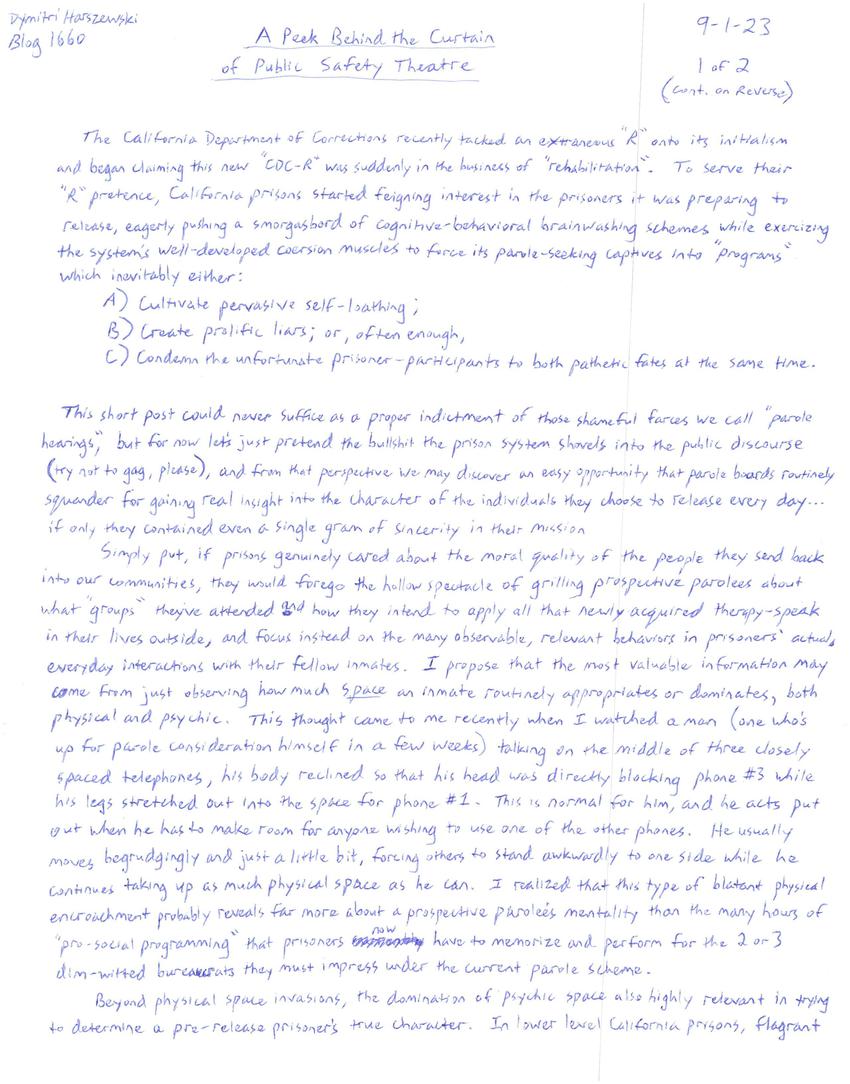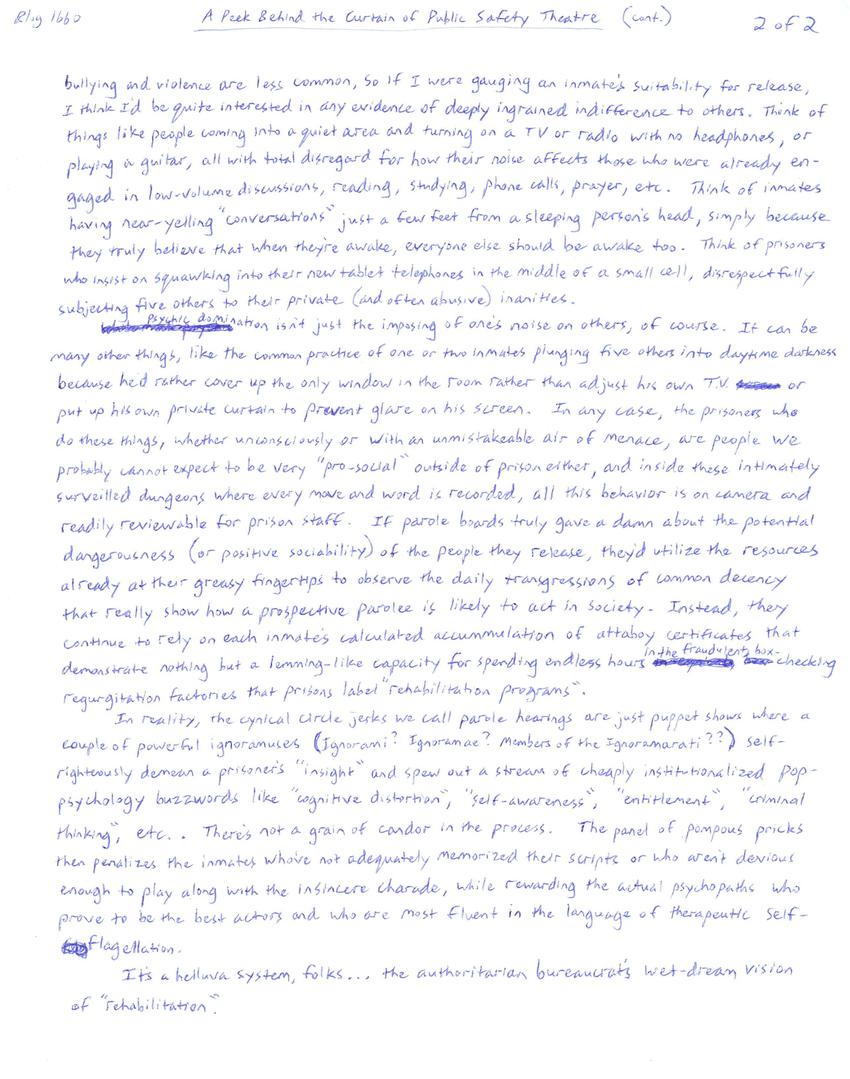
Transcription
Dymitri Haraszewski
Blog 1660
9-1-23
A Peek Behind the Curtain of Public Safety Theatre
The California Department of Corrections recently tacked an extraneous "R" onto its initialism and began claiming this new "CDC-R" was suddenly in the business of "rehabilitation". To serve their "R" pretense, California prisons started feigning interest in the prisoners it was preparing to release, eagerly pushing a smorgasbord of cognitive-behavioral brainwashing schemes while exercising the system's well-developed coercion muscles to force its parole-seeking captives into "programs" which inevitably either:
A) Cultivate pervasive self-loathing;
B) Create prolific liars; or, often enough,
C) Condemn the unfortunate prisoner-participants to both pathetic fates at the same time.
This short post could never suffice as a proper indictment of those shameful farces we call "parole hearings", but for now let's just pretend the bullshit the prison system shovels into the public discourse (try not to gag, please), and from that perspective we may discover an easy opportunity that parole boards routinely squander for gaining real insight into the character of the individuals they choose to release every day? if only they contained even a single gram of sincerity in their mission.
Simply put, if prisons genuinely cared about the moral quality of the people they send back into our communities, they would forego the hollow spectacle of grilling prospective parolees about what "groups" they've attended and how they intend to apply all that newly acquired therapy-speak in their lives outside, and focus instead on the many observable, relevant behaviors in prisoners' actual everyday interactions with their fellow inmates. I propose that the most valuable information may come from just observing how much space an inmate routinely appropriates or dominates, both physical and psychic. This thought came to me recently when I watched a man (one who's up for parole consideration himself in a few weeks) talking on the middle of three closely spaced telephones, his body reclined so that his head was directly blocking phone #3 while his legs stretched out into the space for phone #1. This is normal for him, and he acts out when he has to make room for anyone wishing to use one of the other phones. He usually moves begrudgingly and just a little bit, forcing others to stand awkwardly to one side while he continues to take up as much space as he can. I realized that this type of blatant physical encroachment probably reveals far more about a prospective parolees mentality than the many hours of "pro-social programming" that prisoners now have to memorize and perform for the 2 or 3 dim-witted bureaucrats they must impress under the current parole scheme.
Beyond physical space invasions, the domination of psychic space is also highly relevant in trying to determine a pre-release prisoner's true character. In lower level California prisons, flagrant bullying and violence are less common, so if I were gauging an inmate's suitability for release, I think I'd be quite interested in any evidence of deeply ingrained indifference to others. Think of things like people coming into a quiet area and turning on a TV or radio with no headphones, or playing a guitar, all with total disregard for how their noise affects those who were already engaged in low-volume discussions, reading, studying, phone calls, prayer, etc. Think of inmates having near-yelling "conversations" just a few feet from a sleeping person's head, simply because they truly believe that when they're awake, everyone else should be awake too. Think of prisoners who insist on squawking into their new tablet telephones in the middle of a small cell, disrespectfully subjecting five others to their private (and often abusive) inanities.
Psychic domination isn't just the imposing of one's noise on others, of course. It can be many other things, like the common practice of one or two inmates plunging five others into daytime darkness because he's rather cover up the window in the room rather than adjust his own TV or put up his own private curtain to prevent glare on his screen. In any case, the prisoners who do these things, whether unconsciously or with an unmistakable air of menace, are people we cannot expect to be very "pro-social" outside of prison either, and inside these intimately surveilled dungeons where every move and word is recorded, all this behavior is on camera and readily reviewable for prison staff. If parole boards truly gave a damn about the potential dangerousness (or positive sociability) of the people they release, they'd utilize the resources already at their greasy fingertips to observe the daily transgressions of common decency that really show how a prospective parolee is likely to act in society. Instead, they continue to rely on each inmate's calculated accumulation of attaboy certificates that demonstrate nothing but a lemming-like capacity for spending endless hours in the fraudulent box-checking regurgitation factories that prisons label "rehabilitation programs".
In reality, the cynical circle jerks we call parole hearings are just puppet shows where a couple of powerful ignoramuses (Ignorami? Ignoramae? Members of the Ignoramarati?) self-righteously demean prisoner's "insight" and spew out a stream of cheaply institutionalized pop-psychology buzzwords like "cognitive distortion", "self-awareness", "entitlement", "criminal thinking", etc. There's not a grain of candor in the process. The panel of pompous pricks then penalizes the inmates who've not adequately memorized their scripts or who aren't devious enough to play along with the insincere charade, while rewarding the actual psychopaths who prove to be the best actors and who are the most fluent in the language of therapeutic self-flagellation.
It's a helluva system, folks... the authoritarian bureaucrats' wet-dream vision of "rehabilitation".
Other posts by this author
|
2026 jan 14

|
2026 jan 14

|
2026 jan 14

|
2026 jan 14

|
2026 jan 14

|
2026 jan 14

|
More... |



Replies (11)
I hope you're doing well, and please continue to write!
While it was 8 months ago, I haven't forgotten about it. I get notifications in the mail when something new is posted by someone I followed, so I usually notice new posts (comment replies are displayed as just that and to be honest I didn't expect one). So this time I missed it, because I wasn't expecting anything and I kind of forgot that comment replies don't have any details in them. But since I regularly check the site, I saw your comment reply.
I'm not American, so the finer details of the whole parole system escape me, and what happens inside prison during hearings is something I rarely read about. Sure, I had my suspicions about it being a dog and pony show but with psycho-babble and buzzwords, but I didn't quite expect this level of issues. Indeed with all the CCTV they have going on, you'd expect them to have a much better picture of who they are, instead of relying on how well the show was done. But I guess that's what we should expect from a system that's rooted in capitalism. There is no money available to do any analysis of the recorded video and it takes hours to sift through all that material, so they simply don't start on it. That's my theory so far.
Anyway, thanks for your reply!
Ms. Amnesia
Your reply appeared as before, but it did help me to see that it was intended for me. Indeed, it takes maybe 2 weeks to get to you and 2 weeks to appear on the site, so a month in all. Not bad for an asychronus hybrid system of printing and scanning as an interface to the world. I used to have penpals writing that way before institutional emails became accessible as it was way faster than waiting for letters to be shipped overseas. (It was a service like between the bars, but for private letters). And now almost every facility in the country has some form of institutional emails. I know for a fact that it's almost, because I know of at least one state with no institutional emails yet.
If you somehow can create a post based on the transcripts that would be amazing. I know a full transcript is way too long to send this way, but a condensed version with commentary might be an interesting approach to spread more awareness of what really goes on.
As for monitoring, I'm aware that the tablets that are probably being used to monitor all sorts of secondary data, like how you use it and what you do most, but also whether you work on the betterment of yourself or are just using it as a form of entertainment. I have seen proposals for this out there on the internet, most in the context of "social contracts" and "social investments" (which are as dystopian as they sound). "Quantifying" is another of those buzzwords they like to use in these proposals. As if it has some sort of meaning by itself. Obviously they won't publish anything about it, but at least from the social investment angle there was some information. I don't know how much of it is just ideas or plans, nor how much of this is already implemented and analysed. I've seen one proposal for a certain facility, but that one had been up there for a couple of years now and it looks like nothing came from it. (All that I found was from the pre-covid era).
I hope you had a good month!
MsAmnesia